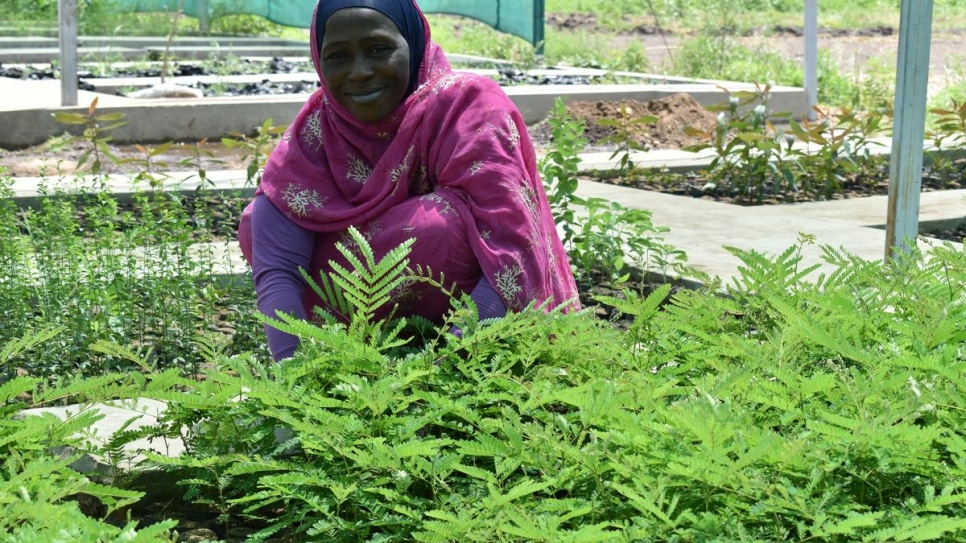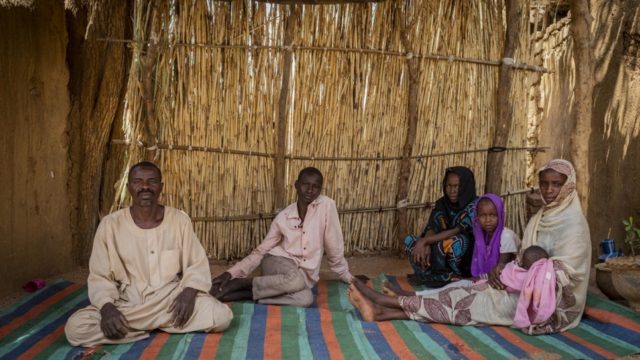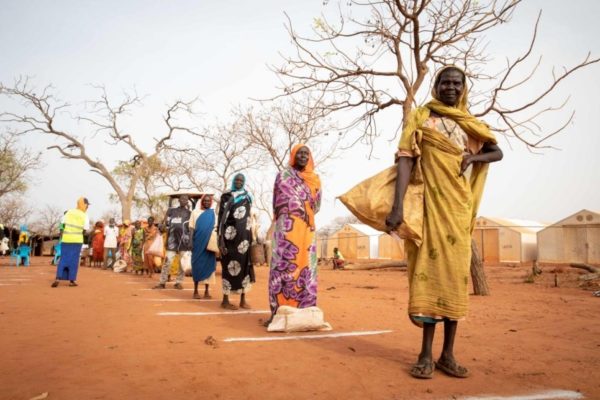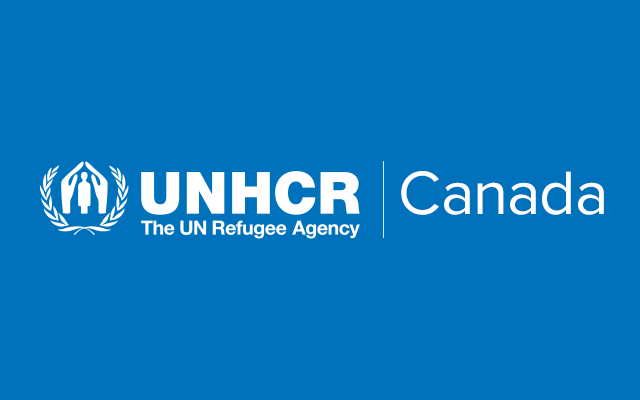
A woman tends to saplings in the tree nursery in Al Jabalain, Sudan. © UNHCR/Vanessa Zola
Refugees and their hosts together plant one million trees in a massive reforestation drive in the White Nile State in Sudan.
A thick rubber pipe snakes its way from Sudan’s White Nile River for over two kilometres, pumping its contents into a large reservoir in Al Jabalain locality, where thousands of saplings are growing.
The tree nursery has a capacity to produce 200,000 saplings a year – the fruit of a partnership between the country’s forestry body, the Forests National Corporation (FNC), and UNHCR, the UN Refugee Agency.
The project, located in a semi-arid area largely stripped of trees for firewood and construction materials, started in 2017. It has since planted an estimated one million trees of four different Acacia species, spread over 2,500 hectares of land.
Geal Deng Nyakong, a South Sudanese refugee, works at the nursery. She has seen firsthand how deforestation has taken a toll on the environment she has called home since fleeing violence in South Sudan in 2014.
“I joined the project to earn a bit of money for food and some clothes and to learn new skills about tree plantation,” says Nyakong, who hopes to use these skills back home or in future work at nearby citrus plantations.
There are about a quarter of a million South Sudanese refugees in White Nile State, which has a population of over 1.7 million people.
Nyakong, and thousands of women like her, frequently spend up to eight hours trekking to remote forest areas to forage for increasingly scarce firewood – a journey that leaves them vulnerable to sexual violence.
“It’s promoting safe access to sustainable cooking energy while addressing environmental challenges.”
In addition to boosting sustainability, Imadeldin Ali, UNHCR’s Livelihoods Associate Officer based in Kosti, expects the reforestation drive to create a more secure environment for vulnerable refugees and local people alike.
“It’s also brought firewood production closer to the refugee camps thus promoting safe access to sustainable cooking energy while addressing environmental challenges through natural resource management,” he says.
In White Nile, deforestation is particularly serious. In addition to firewood, refugees cut wood and poles in unsustainable quantities to build their shelters. In some cases, some sell part of their food rations to buy firewood and charcoal.
To address these concerns, UNHCR’s engagement with the FNC is helping rehabilitate and manage forests, both for the provision of cooking fuel and for conserving the environment in the long run.
“Our plan this year is to set up woodlots or smaller forests around each of the nine camps in the state to replace the trees cut down by refugees over the years,” explains Ali.
Another challenge is the semi-arid climate with summer temperatures reaching 48 degrees Celsius, which makes it tough to cultivate. In a bid to give the saplings a better chance at taking root, UNHCR and FNC, in partnership with Innovation Norway, a development agency of the Norwegian government, and the Dutch Land Life Company, are experimenting with growing them in cocoons in the tree nursery where Nyakong works.
A cocoon is a biodegradable ‘incubator’ designed to support a sapling through its critical first year by providing water and shelter while stimulating a healthy and deep root structure, tapping into the water supply beneath the surface.
The cocoon stores water for about three months, enabling seedlings to get through to the rainy season. This results in independent trees that can survive in harsh conditions. Cocoons are said to improve the survival rate of seedlings by 75 to 95 per cent.
“The community benefits a lot from this project and we are grateful for it.”
The reforestation project is also proving to be positive for community relations in an area where competition for already scarce resources has in the past resulted in tensions and conflicts between refugees and local communities.
At the tree nursery, Nyakong plants and tends seedlings alongside Sudanese neighbours like Hawua Ahmed, who lives close to the refugee camps. While women tend to the seedlings, men transplant them to the forest sites.
“The community benefits a lot from this project and we are grateful for it,” Ahmed says.
Originally published on UNHCR on 08 June 2020





